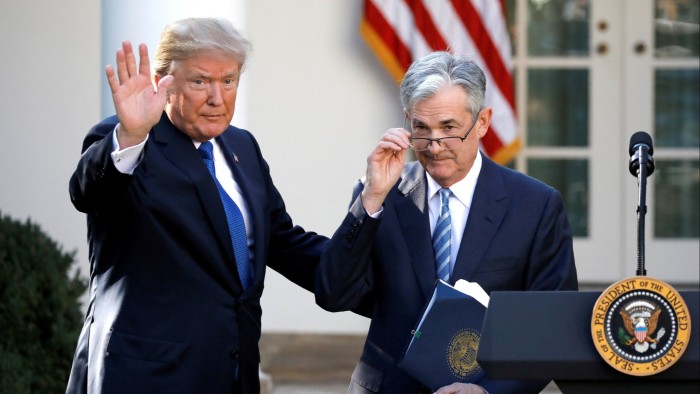Unlock the White House Watch newsletter for free
Your guide to what the 2024 US election means for Washington and the world
Donald Trump said he would not seek to remove Federal Reserve chair Jay Powell before his term expires in May 2026, but promised to push ahead with sweeping tariffs, mass deportations and tax cuts in his first days in the White House.
In an interview with NBC News’s Meet the Press, Trump spoke about his priorities for the world’s largest economy when his second administration begins in January, including curtailing aid to Ukraine and reducing bloat across the government.
When asked if he had plans to replace Powell, who was tapped by Trump in 2017 and later renominated by President Joe Biden for a second term as head of the US central bank, the president-elect said he did not.
“I think if I told him to, he would. But if I asked him to, he probably wouldn’t,” Trump added.
Since winning the US presidential election last month, concern has grown across Wall Street and Washington that Trump would threaten the independence of the Fed, which is seen as crucial to the stability both of the global economy and financial markets.
On the campaign trail, Trump seemed to suggest that he would continue the attacks of his first term, in which he called Powell an “enemy” for resisting his calls for lower interest rates.
Trump has questioned whether he should have a more direct say in monetary policy decisions. Scott Bessent, his pick for Treasury secretary, has also floated the idea of announcing an heir apparent who would act as a “shadow” Fed chair, undermining the institution’s communications by issuing contradictory guidance on the policy outlook.
Just after the election, Powell was adamant that he would not step down early from his post even if the president-elect asked him to. He also told reporters that there were no legal grounds for him to be removed early.
Last week, he added that he was “not concerned” about the Fed’s independence during a second Trump administration, saying it was protected by “the law of the land”.
Economists are bracing for tension however, given their expectation that Trump’s plans to enact tariffs on trading partners, deport immigrants in large numbers and boost growth via lower taxes and regulations will stoke price pressures, thereby limiting how much the Fed will be able to lower interest rates overall.
The Fed has already cut its benchmark policy rate twice since September and is poised to do so again later this month, but officials have begun to hint that the pace will slow in 2025.
Trump conceded that he “can’t guarantee anything” in terms of higher costs for Americans if his tariff proposals are enacted, although he denied that they would weaken the economy. He also again touted such levies as a negotiating tool, saying he had “stopped wars with tariffs”.
The president-elect said he also had “no choice” but to deport all illegal immigrants in the US. But he said he would work with Democrats on a plan for undocumented people who entered the country as children. He also vowed to end birthright citizenship via executive action.
On his efforts to reduce government spending, Trump said his administration would raise ages for entitlement programmes like Social Security or Medicare. “People are going to get what they’re getting,” he said.
Those plans would probably be accompanied by a pullback in the US’s involvement oversees, including in its provision of aid to Ukraine as well as its involvement in Nato, the president-elect said.






